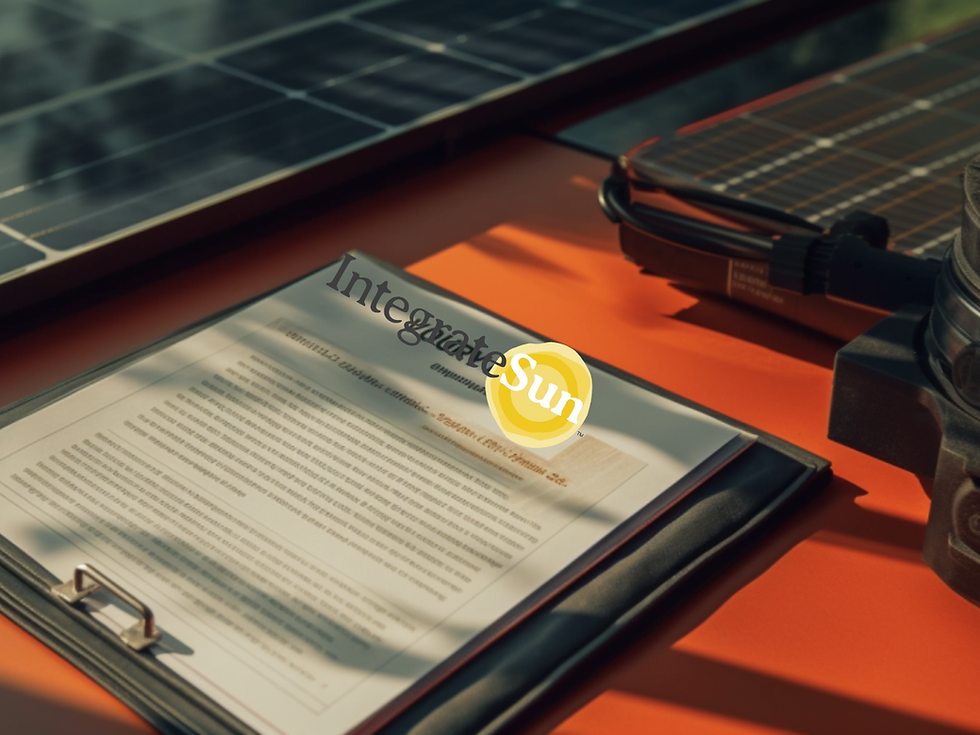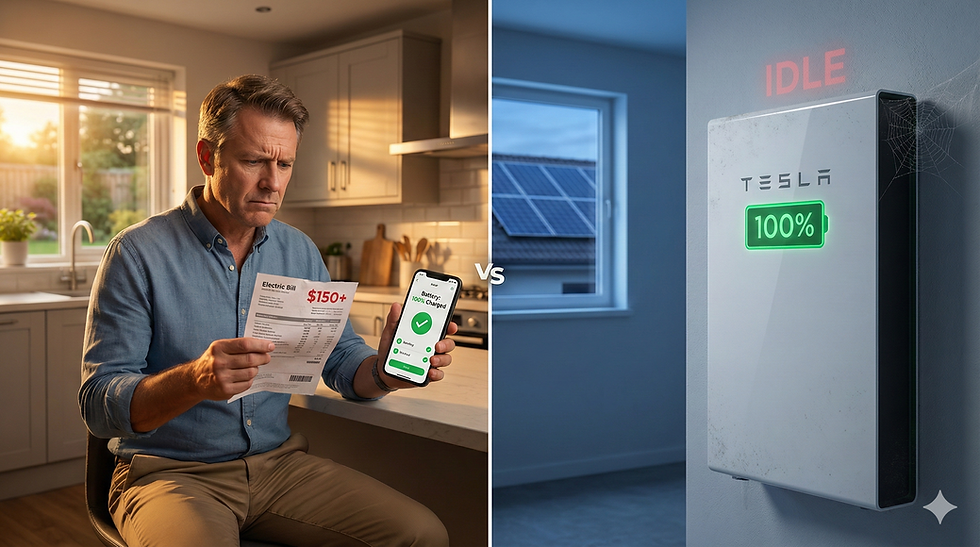The True Lifespan of Solar Panels: A Warranty Guide
- ifeoluwa Daniel
- Jul 27, 2023
- 6 min read
Updated: Jul 28, 2023

Table of Contents
Have you ever questioned the lifespan of your solar panels? Or what happens if they don't perform as promised? Let's dive into the world of solar panel warranties and discover the true lifespan of your solar panels. The warranty, a sometimes forgotten but essential component of your solar purchase, will be clarified in this guide.
Key Highlights
Solar panel warranties are crucial, providing a safety net for your investment.
Warranties cover performance and workmanship, ensuring panels produce electricity and are free from defects.
Not all issues are covered by warranties, such as damage from extreme weather or improper installation.
Comparing warranties is essential when choosing a solar panel system, considering both performance and product aspects.
Certain actions, like DIY installation or improper maintenance, can void your warranty.
Solar warranties offer peace of mind, and cost-effectiveness, and can increase a home's resale value.
What's In The Average Solar System Warranty?
When you invest in a solar energy system, you're not just buying panels - you're buying peace of mind. But what does that really mean? Let's break it down...
A solar panel warranty is your safety net. It's a promise from the manufacturer that your panels will perform at their best for a certain period of time. But not all warranties are created equal. The average solar system warranty can be split into two categories: the performance warranty and the workmanship warranty.
The performance warranty guarantees that your panels will produce near their rated output over the life of ownership. Think of it as a promise that your panels will keep soaking up the sun and converting it into electricity for your home.
The workmanship warranty, on the other hand, covers any physical defects that stem from manufacturing errors. It's the manufacturer's way of saying, "We stand by the quality of our products."
Understanding these warranties is crucial for anyone looking to harness the power of the sun. After all, a solar energy system is a significant investment, and you want to make sure it's protected. So, as you embark on your solar journey, remember: a warranty is more than just a piece of paper. It's a promise of performance, a badge of quality, and your ticket to a brighter, greener future. More details on this in the later sections.
Things that Solar Panel Warranty Does Not Cover
Now, let's flip the coin and look at the other side. What doesn't a solar panel warranty cover? Well, while warranties are your safety net, they aren't a magic shield. There are certain issues that most warranties won't cover.
Firstly, DIY installation? Not the best idea. If you install the panels yourself, you might void your warranty.
The same goes for repairs. If an unlicensed worker repairs your system or if you make repairs without the company's authorization, you could be waving goodbye to your warranty.
How about damage from extreme weather events like hurricanes or hailstorms typically falls outside the warranty? So, if Mother Nature decides to play rough, your warranty might not come to the rescue.
Similarly, damage due to improper maintenance is usually not covered. That's why it's crucial to choose a reputable solar installation company and follow the recommended maintenance practices.
And remember, warranties don't cover gradual wear and tear. Over time, solar panels naturally degrade and produce less electricity. This degradation rate is usually accounted for in the performance warranty, but it's something to keep in mind.
But here's a bright spot: homeowners insurance that covers the house should pick up the bill in the event of damage. So, don't forget to add your solar panels to your homeowner's insurance as soon as they're installed. In fact, some insurance companies might even offer you a discount on your premium when you install solar panels. They can be seen as a shield for your roof, after all! So, how do you avoid these pitfalls? Choose a reputable solar installation company, follow their maintenance guidelines, and always consult them before making any repairs. As a result, it's recommended to remain with just one installer rather than jumping from one to another.
How to Compare the Warranties on Solar Panels
So, you're ready to go solar, and you're looking at different solar panel manufacturers. How do you compare their warranties? It's not just about the length of the warranty, but also what it covers.
Most solar panels come with a 25-year performance warranty, which is the industry standard for Tier 1 manufacturers. But don't just stop there. Look at the workmanship warranty too. This covers physical defects and varies by manufacturer. Some offer 10-year workmanship warranties, others might offer more.
And don't forget to check the fine print for the degradation rate. This tells you how much the panel's performance is expected to decrease each year. A lower degradation rate means your panels will produce more electricity over their lifetime.
Comparing warranties can feel like navigating a maze. But remember, the goal is to find a warranty that gives you the best protection for your solar investment. So, take your time, ask questions, and make sure you understand what you're getting. After all, going solar is a long-term commitment, and you want to make sure it's a journey you're well-prepared for.
Performance Warranty Vs A Product Warranty?
When it comes to solar panel warranties, there's more than meets the eye. You've got performance warranties and product warranties, and each plays a different role in protecting your solar investment. So, what's the difference?
A performance warranty is like a promise of endurance. It guarantees that your solar panels will continue to produce electricity at a certain level throughout their lifetime. Sure, all solar panels degrade over time, but with a performance warranty, you're covered if the degradation is more than expected. Think of it as a safety net, ensuring your panels keep up the good work for years to come.
On the other hand, a product warranty is all about the quality of the solar panels themselves. It covers you if there's a defect or failure in the equipment. So, if your panels stop working due to a manufacturing error, a product warranty has got your back.
But wait, there's more! Some manufacturers offer warranties that combine both performance and product aspects. These comprehensive warranties provide an extra layer of protection, covering both the performance and the quality of your solar panels.
What Can Void The Lifespan of Your Solar Panel?
Now, let's talk about what could potentially void your solar panel warranty. It's like a game of chess - you need to make the right moves to stay in the game.
Firstly, DIY installation? Not the best idea. If you install the panels yourself, you might void your warranty.
The same goes for repairs. If an unlicensed worker repairs your system or if you make repairs without the company's authorization, you could be waving goodbye to your warranty.
Also, remember to treat your solar panels with care. Extreme chemical exposure or failure to maintain your panels properly could also void your warranty.
So, how do you avoid these pitfalls? Choose a reputable solar installation company, follow their maintenance guidelines, and always consult them before making any repairs. That way, you can keep your warranty intact and your solar panels shining bright.
Remember, a warranty is more than just a piece of paper. It's your ticket to a worry-free solar journey. So, make sure you understand your warranty, play by the rules, and enjoy the ride toward a greener future.
The Benefits of a Solar Warranty
So, why should you care about a solar warranty? Well, it's not just about protection - it's about peace of mind. A solar warranty is your ticket to a worry-free solar journey. Here's why:
Firstly, a solar warranty alleviates concerns about costly repairs. If something goes wrong, you're covered. It's like having a safety net, ready to catch you if you fall.
Secondly, it offers convenient help. Need repairs? Just make a call or send an email, and help is on the way. No need to scramble for a solution - your warranty has got you covered.
Thirdly, a solar warranty is a long-term cost-effective solution. By reducing potential repair costs, you're paving the way for big savings down the line.
Lastly, a solar warranty can be a great selling point if you ever decide to sell your home. More and more buyers are looking for homes with solar panels, and a warranty ensures that any unexpected problems will be covered.
Obtain A Solar Warranty To Protect Your Solar System
The next step is frequently to check what is covered by a solar warranty after receiving a free estimate of your solar savings.
Manufacturers of solar panels provide consumers with long-term guarantees on their products to demonstrate the robustness and durability of their goods and to give them confidence in their investment. To evaluate and contrast various warranties, it is crucial to understand what is covered by a solar system warranty and what is not.
Researching your warranty and learning about the many alternatives that are appropriate for your requirements will help ensure that you are protected in the event that something goes wrong.
Here are some things to remember:
Your financial investment and the physical hardware are both covered by solar panel warranties.
Usually, panels have a 25-year performance warranty.
Additionally, a 10- to 25-year product guarantee is included with solar panels.
To find out what is covered and what might invalidate a warranty, you should carefully review any that you want to buy.
Warranties are affordable, may raise a home's resale value, and provide you with a sense of security.
FAQ
What is the real lifespan of solar panels?
The real lifespan of solar panels typically ranges between 25 to 30 years. However, they don't stop producing electricity after this period, they just operate less efficiently.
Are solar panel warranties worth it?
Yes, solar panel warranties are worth it. They provide a safety net for your investment, covering performance and workmanship issues.
What is the life expectancy of solar panels in 2023?
In 2023, the life expectancy of solar panels remains consistent at 25 to 30 years, depending on the quality of the panels and maintenance practices.
What happens to solar panels after 25 years?
After 25 years, solar panels continue to produce electricity, albeit at a reduced efficiency, typically around 80% of their initial output.



